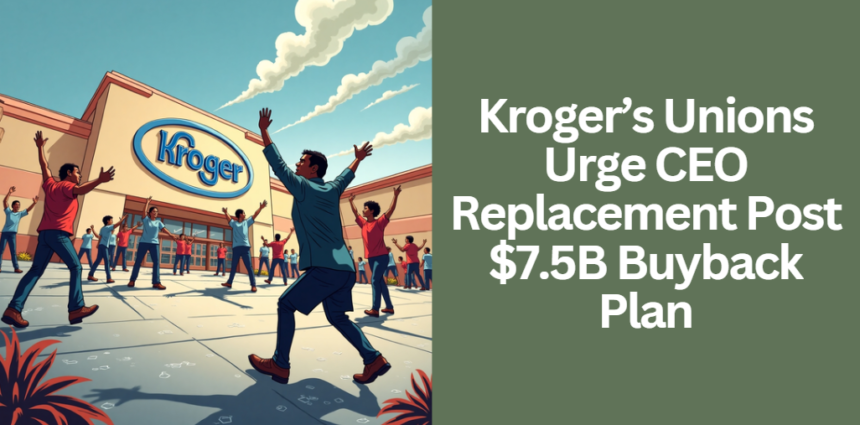In recent news, the controversy surrounding Kroger’s corporate decisions has sparked widespread debate across multiple stakeholder groups. Following the failed merger with Albertsons and the subsequent announcement of a massive $7.5 billion stock buyback plan, a group of local unions has taken a strong stance.
They are demanding a change in leadership, arguing that the company’s focus on shareholder returns is misguided at a time when investments in staffing, store improvements, and employee welfare are urgently needed. This article provides an extensive, detailed, and easy-to-read guide on the subject of Kroger’s Unions Urge CEO Replacement Post $7.5B Buyback Plan, offering insights into the background, union reactions, financial analysis, and future implications for Kroger.
Background and Context
Understanding the roots of this controversy requires looking back at the series of events leading up to the current situation. Initially, Kroger had been engaged in a proposed $25 billion merger with Albertsons, a deal that was anticipated to reshape the grocery industry. However, regulatory hurdles and judicial blocks forced the merger to collapse. In the wake of this failed merger, Kroger swiftly shifted its strategy by announcing a $7.5 billion stock buyback plan. The plan includes an accelerated repurchase of approximately $5 billion in common stock, signaling the company’s intent to bolster short-term shareholder value.
A timeline of critical events can be summarized in the following table:
| Date | Event Description |
|---|---|
| Late 2022 | Merger talks with Albertsons begin |
| December 2024 | Merger terminated after judicial block |
| December 2024 | Announcement of $7.5B stock buyback plan |
| Early 2025 | Local unions demand CEO replacement |
This sequence of events sets the stage for the union’s reaction and the broader implications for corporate governance and financial strategy.
Union Reaction and Demands
Local unions, particularly those affiliated with the UFCW, have voiced strong criticisms of Kroger’s decision. Their central argument is that investing billions in stock buybacks diverts crucial resources away from essential areas such as improving wages, upgrading store facilities, and hiring additional staff. Union leaders have stated that such financial maneuvers are merely a short-term tactic designed to boost the stock price while neglecting the long-term needs of both employees and consumers.
A closer look at the unions’ perspective reveals several key points:
- Resource Allocation Concerns: Union representatives argue that the $7.5 billion could fund significant improvements in store operations and employee benefits.
- Leadership Accountability: They claim that the current CEO, Rodney McMullen, has failed to prioritize these critical investments, prompting calls for his replacement.
- Historical Context: This is not the first time that unions have clashed with corporate management over financial decisions. Past labor movements have similarly contested strategies that favor shareholder returns over internal investments.
The unions have articulated their demands through press releases and public statements, urging the board to consider leadership change as a necessary step towards realigning the company’s priorities.
Corporate Governance and Leadership at Kroger
The role of a CEO in a major corporation extends beyond managing daily operations; it also involves setting long-term strategic goals that balance the interests of all stakeholders. Critics of Kroger’s leadership argue that the decision to prioritize a $7.5 billion buyback reflects a misplaced focus on short-term financial gains rather than sustainable business growth. In the wake of the failed merger, the board’s decision to resume share repurchases has been met with skepticism, with union voices pushing for a fresh perspective at the helm.
Historically, when leadership changes occur in such turbulent times, it often signifies a turning point. With calls for the replacement of the current CEO, the board is now under pressure to either address these concerns or face a growing disconnect between management and the workforce. The leadership dynamics at Kroger are critical, as any change in management could impact everything from strategic investments to employee morale.
Financial Analysis of the Buyback Plan
From a financial perspective, stock buybacks are often used as a tool to return excess cash to shareholders, which can in turn boost share prices. In Kroger’s case, the $7.5 billion buyback plan is seen by many investors as a way to signal confidence in the company’s balance sheet, especially after the collapse of the merger with Albertsons. However, this approach has sparked controversy because it raises several important questions about long-term strategic investments.
An easy-to-understand breakdown of the financial rationale behind stock buybacks is as follows:
- Definition: A stock buyback involves a company purchasing its own shares from the marketplace, reducing the number of outstanding shares.
- Short-Term Impact: The reduction in shares can lead to an increase in earnings per share (EPS) and often drives up the stock price.
- Long-Term Concerns: Critics argue that funds used for buybacks might be better allocated toward improving operational efficiency, expanding the store network, or increasing employee compensation.
For visual clarity, consider the following list comparing the two approaches:
| Aspect | Stock Buybacks | Reinvestment in Business |
|---|---|---|
| Purpose | Boost share price and deliver short-term gains | Enhance operational capacity and quality |
| Impact on EPS | Increases due to fewer shares outstanding | No direct EPS boost, but improves performance |
| Long-Term Sustainability | Can be unsustainable if overused | Strengthens business fundamentals |
| Stakeholder Benefits | Primarily benefits shareholders | Benefits employees, customers, and community |
Impact on Stakeholders
The repercussions of Kroger’s decision extend to various stakeholders. For employees, the promise of higher wages, better working conditions, and improved store environments remains unfulfilled. The unions argue that these improvements are crucial not only for worker morale but also for maintaining competitive pricing and service quality.
For shareholders, the buyback may offer a short-term uplift in stock prices, yet the long-term growth prospects could suffer if essential investments are neglected. Consumers, on the other hand, might experience reduced benefits in the form of improved services or lower prices, as the focus shifts away from operational enhancements.
The overall effect is a complex balancing act where each stakeholder group has different priorities. The union’s stance highlights the growing divide between traditional financial management practices and the increasing demand for corporate responsibility that benefits all parties.
Market and Media Reactions
Financial analysts and media outlets have weighed in on this unfolding drama, providing a mix of opinions. While some analysts see the buyback as a necessary measure to stabilize Kroger’s stock after the failed merger, others echo the concerns of the unions, emphasizing that sustainable growth depends on reinvestment in the business.
Media coverage has been extensive, with detailed reports from reputable sources such as Reuters and Supermarket News. Social media platforms have also become a battleground for public opinion, where employees, consumers, and industry experts discuss the broader implications of the decision.
Strategic Implications for Kroger
The strategic landscape for Kroger is evolving rapidly. The controversy surrounding the $7.5 billion buyback plan and the subsequent union demands have forced the company to re-examine its priorities. Future strategies may need to strike a balance between delivering short-term financial performance and ensuring long-term operational improvements. Lessons from this episode could reshape how corporate governance is approached in the retail sector, with an increased focus on stakeholder engagement and sustainable investment.
Key considerations for Kroger moving forward include:
- Addressing internal demands for better working conditions and store improvements.
- Enhancing transparency in decision-making processes to regain trust.
- Exploring new strategic initiatives that offer long-term benefits while maintaining financial stability.
Comparative Analysis with Competitors
In the competitive grocery industry, companies are constantly assessing the balance between shareholder returns and reinvestment in the business. When compared to competitors like Walmart and Costco, Kroger’s approach appears more aggressively focused on short-term financial maneuvers. Several case studies reveal that companies prioritizing reinvestment often enjoy better long-term performance and higher employee satisfaction. This comparative insight serves as a valuable lesson, urging Kroger to reassess its strategies if it aims to lead the industry sustainably.
A simple comparative table can be useful:
| Company | Key Focus | Long-Term Strategy |
|---|---|---|
| Kroger | Short-term share buybacks | Pending strategic shift |
| Walmart | Operational efficiency & scale | Consistent reinvestment |
| Costco | Membership value & quality | Steady reinvestment |
FAQs
How could changes in corporate governance at Kroger impact investor confidence in the long term?
Strengthening governance practices and demonstrating a commitment to balanced investments could enhance transparency and trust. While there might be short-term market fluctuations, long-term improvements in governance can lead to sustained investor confidence and more stable growth.
What alternative financial strategies could Kroger consider besides large-scale buybacks?
Kroger could explore reinvesting cash into technology upgrades, employee training programs, and expanding sustainable practices. This strategy might not only improve operational efficiency but also enhance long-term customer satisfaction and brand reputation.
How might a leadership change influence the overall corporate culture at Kroger?
A new CEO could bring fresh perspectives on balancing short-term financial goals with long-term investments. This change may foster a culture of innovation and collaboration that aligns more closely with the expectations of both the workforce and the broader community.
In what ways can enhanced employee involvement shape future strategic decisions at Kroger?
Greater employee involvement through advisory councils or feedback mechanisms could lead to more balanced financial decisions. This inclusion might ensure that investments support both shareholder value and frontline operational improvements.
What potential risks and benefits might arise if union demands for leadership change are met?
Meeting union demands could reduce internal conflicts and boost morale, potentially leading to improved customer service and operational efficiency. However, it might also create transitional uncertainties and challenge the board’s established strategic framework.
Conclusion
In summary, the issue of Kroger’s Unions Urge CEO Replacement Post $7.5B Buyback Plan encapsulates a pivotal moment for the company. The failed merger with Albertsons, coupled with the decision to pursue a massive stock buyback, has sparked significant union backlash. Stakeholders from employees to investors are watching closely, with many calling for a re-evaluation of leadership and strategic priorities. Ultimately, balancing short-term financial tactics with long-term operational investments will be key to ensuring Kroger’s continued success in a competitive market.
This detailed guide provides a comprehensive look at every facet of the controversy, offering readers valuable insights into corporate governance, financial strategy, and stakeholder impact. The hope is that through informed discussion and strategic adjustments, Kroger can navigate this challenging period and emerge as a stronger, more sustainable business in the long run.
Other Posts
Transform Your Space with Lighting Solutions for Every Home Lumolog





